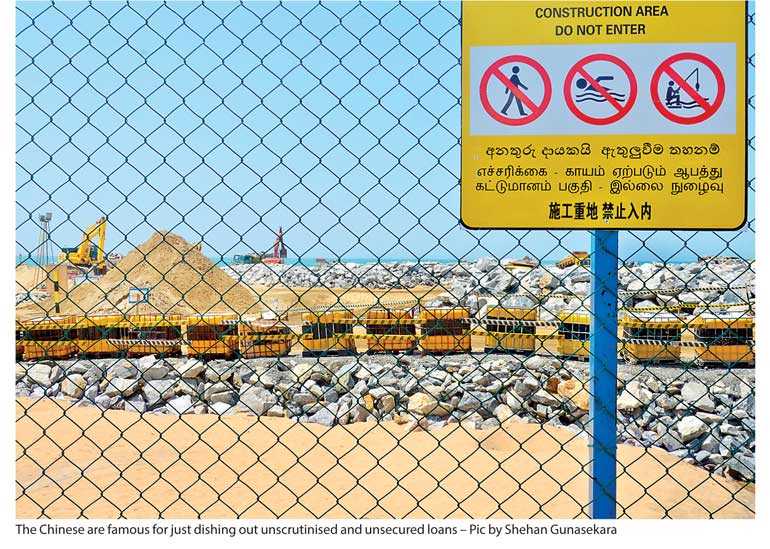Wednesday Feb 25, 2026
Wednesday Feb 25, 2026
Wednesday, 20 June 2018 00:00 - - {{hitsCtrl.values.hits}}

 Real issues ignored in Lankan public discourse
Real issues ignored in Lankan public discourse
Our media poverty
If one takes a close look at the general trend of discourse and debate that has been going on in Sri Lanka, one cannot but be disconcertingly astonished at the poor quality of the island’s print and digital media. The days of quality and erudite journalists are over, it seems.
The stark striking poverty of media discourse is such that all focus is diverted to petty and parochial internal issues of power struggle. On the other hand, something far more fundamental and overridingly serious has been happening to our economy over the last decade and the trend goes on right now. I hardly notice any serious discussion of this except for the Economics Column of one of our weekend English newspapers.
The Sinhala language newspapers are the worst (I am unable to access the Tamil language media). I doubt the swabhasha papers ever seeking to recruit writers on economic or social policy into their fold. One notices some degree of racism in these papers. The internal power struggles going on in the country is the only meat on their table. The situation is little different in the TV media, which is reached by millions of people. There, astrology takes a significant chunk.
The large mass of Sri Lankan people are kept in ignorance. Media feeds into that ignorance and a kind of vicious cycle is in force. Pick most of the formally-educated Sri Lankans and you will notice a foolish nonchalance on their part. I am part of the diaspora and I find hard to find many fellow diasporans who have an awareness of real issues facing Sri Lanka.
If it is politics, it is all about the power struggle-whether between persons and parties or between ethnic groups. Should they have jailed Gnanasara? Will Gota have a chance? Who is the best presidential candidate for 2020? These are might issues for the generality of Sri Lankans
The economics fundamental
These discussions would come to nothing if they take just one fundamental issue that our country is facing. Our whole being as a nation of people would depend on the sustainability of our economy; its viability; its capacity to provide for the population in the long run and to upkeep and expand services needed by the people.
Can’t we have better and more schools or health services? Better modes of transport? All such questions would depend on whether the economy can have space for that. If the economy slides on low growth we slide down as a nation and we face the pain of living and feeding our families.
Even these elementary truths are hardly reflected in the public discourse. In Parliament, except for a very few, MPs are blank on these matters. Recently, Mahinda Rajapaksa said that if they come to power they will reduce taxes by 20%. Prime Minister Ranil Wickremesinghe asked him how he is going to find the funds to fill the gap that results in tax reduction. Probably Mahinda thought it was an unnecessary question. The public are waiting for a response from Mahinda.
Loans from Beijing
If a proper discussion on the economics fundamental takes place, a most dangerous red flag will be raised. How many of you bothered to read the following news story that appeared in our newspapers a few days ago? I quote:
“Sri Lanka has obtained loans from China amounting to more than Rs. 1,029 billion ($ 8.2 billion) in the period 2005 to 2017, information obtained by the way of a Right to Information (RTI) application revealed.
“The loans have been taken from the China Development Bank Corporation and the Export-Import Bank of China and have been for major projects such as highways, power plants, water supply and sewerage schemes.
“More than Rs. 188 billion from these loans went for the work on the Hambantota Port Development Project with the total amount obtained in 2007 of around Rs. 34.2 billion while for Phase II of the project loans amounting to around Rs. 154 billion were obtained from the Export –Import Bank of China in 2012 and 2013.
“In 2005 and 2006, more than Rs. 72 billion was obtained for the Puttalam coal power project. Of this Rs. 30.2 billion came as preferential buyer’s credit and around Rs. 15.9 billion as a buyer’s credit facility.
“Other loans obtained during the previous regime between 2007 and 2015 include funds for the Moragahakanda Development project (Rs. 28.69 billion), purchase of 100 railway passenger carriages (Rs. 3 billion), 15 diesel multiple units (Rs. 4.9 billion), bunkering facility and tank farm project at Hambantota (Rs. 7.4 billion), Mattala International Airport project (Rs. 21.7 billion), MA 60 aircraft project (Rs. 4.63 billion) and procurement of materials for lighting Uva Province (Rs. 3.7 billion).
“Loans had also been obtained for the Colombo-Katunayake express way project, Northern Province power sector development projects, northern road rehabilitation projects, greater Kurunegala water supply and sewerage project and Hambantota hub development project.”
Our sovereignty threatened
My previous critique of our media is vindicated when I realise that Sri Lankan media had not to date carried any discussion or interpretation of these statistics. Isn’t this, alone, frightening? An instance of a self-imposed massive wall of ignorance? The statistics constitute a red flag for the Sri Lankan political economy. We are unobtrusively losing our sovereignty as a nation.
There are many negative things about Beijing loan offers. First, that country does not scrutinise the relevant project for its feasibility. It does not insist on a cost-benefit analysis. It is generally different with American or EU loans. The latter countries want to ensure that the receiving country’s economy benefits; it also wants to ensure that the loaned money is repayable by the project itself.
The second precondition is to guarantee repayment. The Chinese don’t seem to be bothered by such preconditions. Why isn’t Beijing bothered even about repayment potential? That’s where the secret lies and we shall spot that later.
Surely, Hambantota Port Project would never have passed either of the two tests. As we now know, that port is a dead duck. Surely, the International Airport in Mattala would not have passed either of the tests? Another empty project! The International Convention Hall in Hambantota? Where does anybody have conferences there?
The Chinese are famous for just dishing out unscrutinised and unsecured loans off the Exim Bank. They have done this in Africa, Caribbean Islands, and now in the Pacific Islands. From this looseness follows a second aspect, namely that the lack of scrutiny is such that China wouldn’t bother if the loan signed up for contains an element of corrupt money as commissions. This, perhaps, explain the keenness of recipient countries to go for such generosity. Big money can be pocketed by politicians over spurious projects.
Thirdly, China has its own unique manner of recovery: When time comes for repayment the recipient country cannot pay up. The donor, thereupon, opts to become an owner of some facility in the country. Port City loan repayments were partly made by Colombo giving up land for the Shangri-La Luxury Hotel and also giving up the land that housed the former Defence Ministry at Galle Face including the spot where the statue of SWRD stood. Also, Port City, when it functions, will have control by Chinese. Hambantota loan repayment has, probably, been partly paid up by the Sri Lanka Government giving up a huge portion of land as a 99-year lease.
The Opposition cries foul but can they suggest any other way of paying back? Why did they not make provision to payback when their leaders opted for those irresponsible loans? No word on that; yet the JO protests as though they are the good boys. At least the present Government used an institutional device of some modicum of joint ownership.
Pacific Islands
Beijing has done similar deals in Africa, Caribbean and in Pacific Islands. The latest is China’s inroads to the Pacific islands. Last night, I watch an ABC TV program that showed how Vanuatu has been targeted. Massive infrastructure is coming up over there. There is also an International Convention Centre. For what, asked the program presenter. Vanuatu has only a small tourist inflow. How can that Government ever payback the Conference Hall?
Taiwan’s warning
In today’s Australian Newspaper, there is a published warning by Tawan Foreign Minister, Joseph Wa, asking Australia to be extremely mindful of China’s growing dominance in the region. True, the reader has himself to be mindful of the fact that Taiwan and Beijing are foes. On the other hand, what Wa states is of a serious nature. Wa calls for “strategic rebalancing of Asia-Pacific democracies to counter the growing influence of China.” Wa urged Australia to conduct freedom of navigation exercises in the disputed South China Sea region.
What China has done in the South China Sea, says Wa, “is a template for what could happen in other parts of the world, including the Pacific”. Wa points out how China has come to militarise the South China Sea in incremental stages. First, they brought in sand and made up new land areas. Next, came constructions over them. Then, China started putting in military installations. Finally, came up radars, missiles and aeroplanes. All these were done in little stages that were ignored by the world until now when it is too late.
(The writer can be reached via [email protected].)